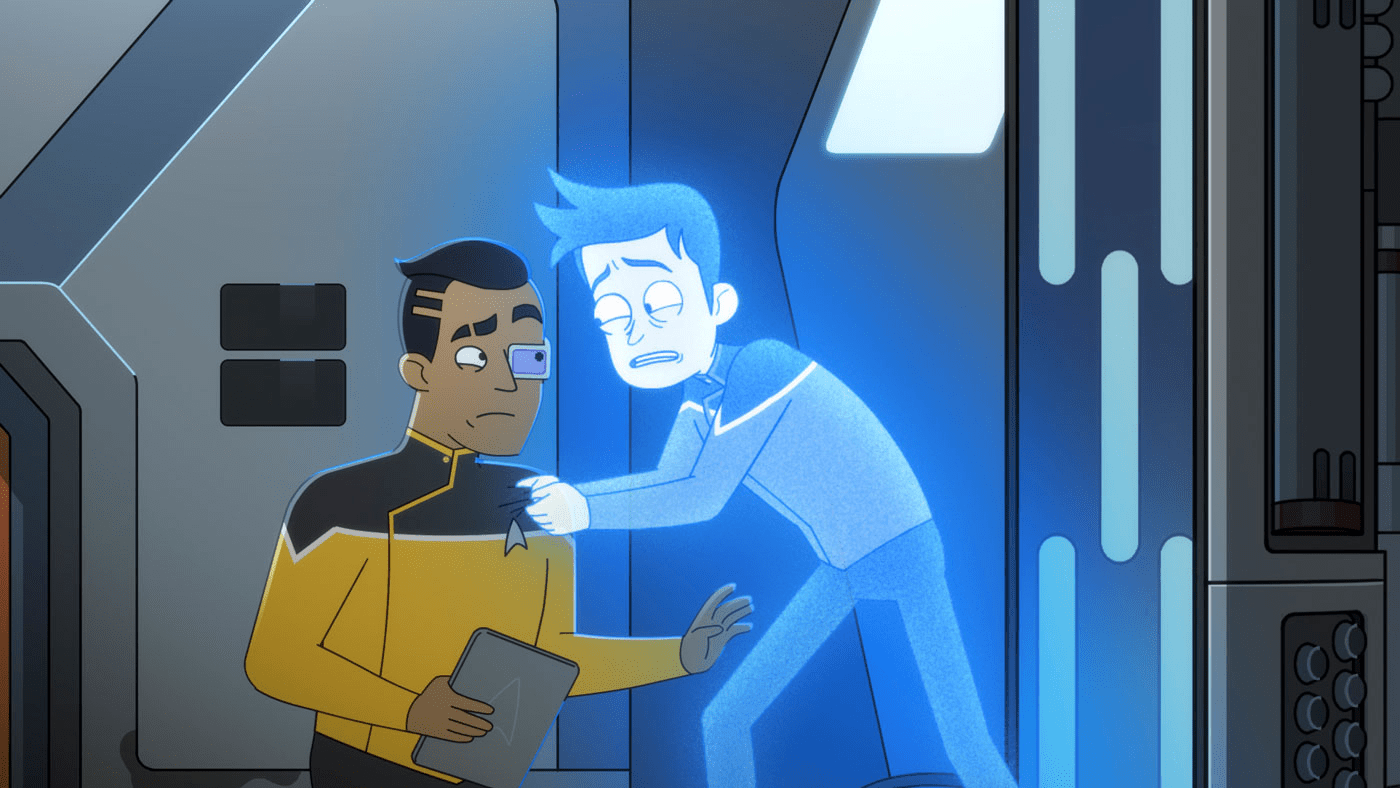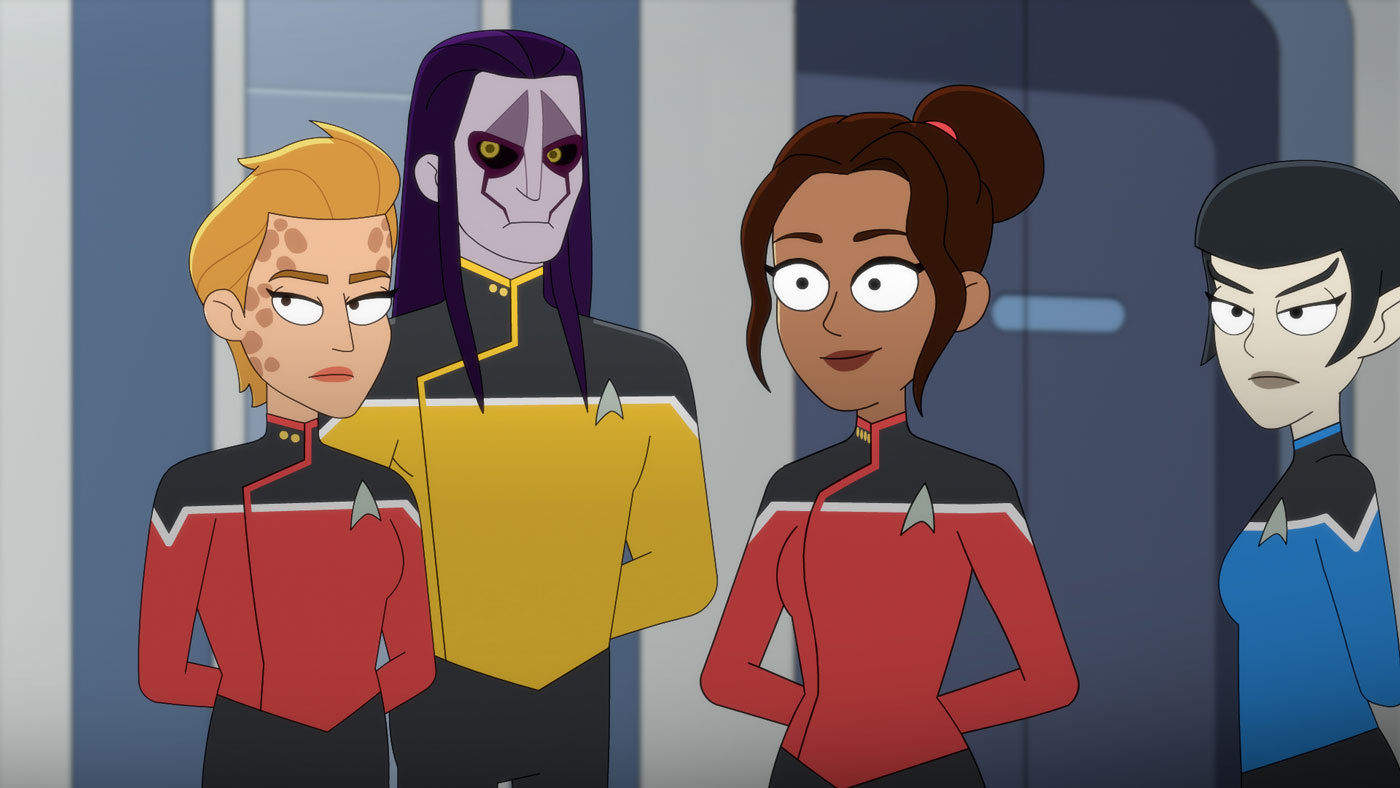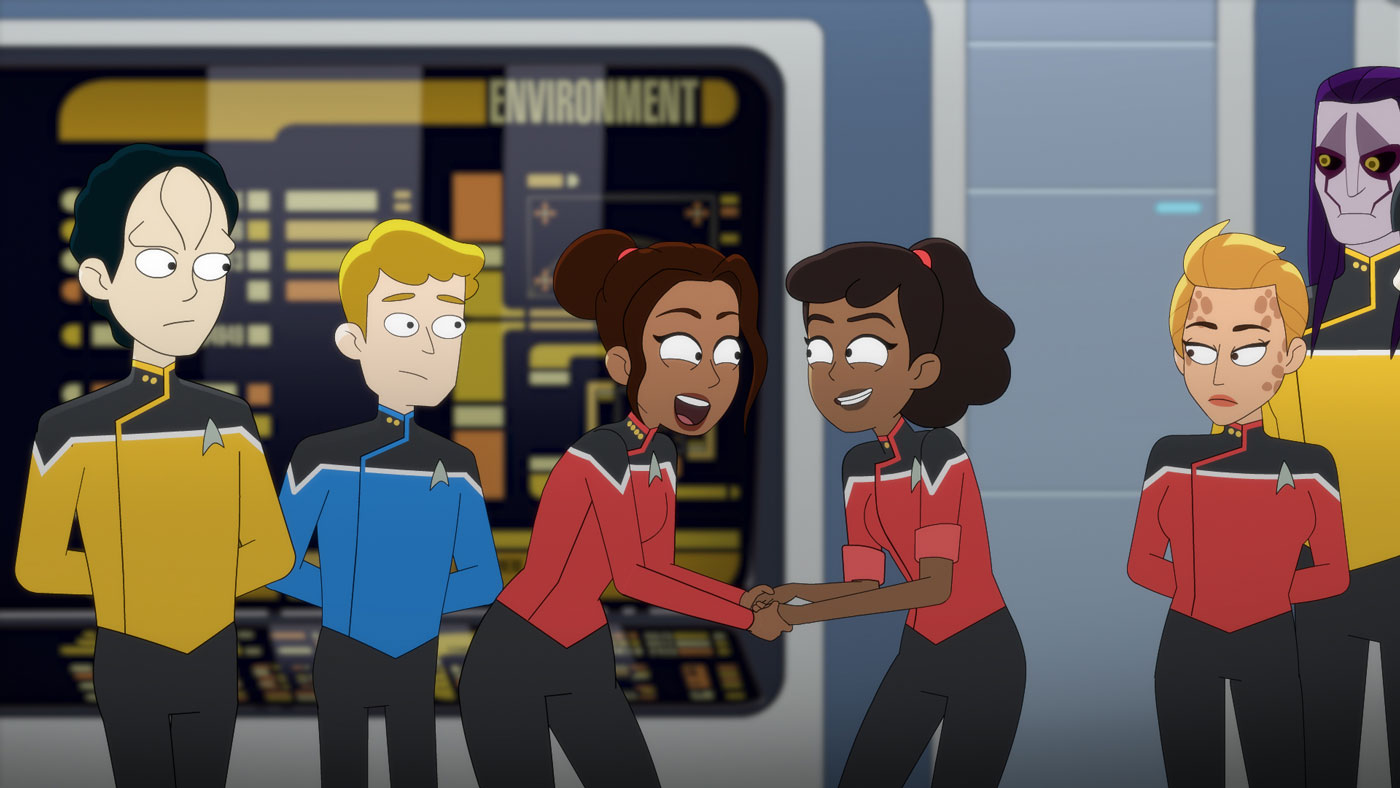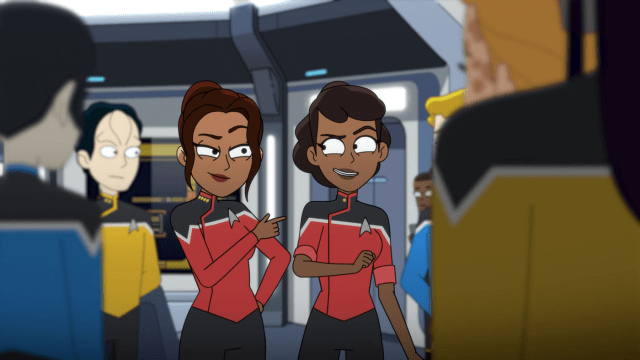Seven episodes into Star Trek: Lower Decks, the show has found itself in a comfortable, if at times frustrating, groove. We have a plot for one half of our Lower Deckers, we have a subplot for the other, and in both, there are lots of fun trope poking. It’s all very earnest and silly fun. But this week, as the show enters is first season endgame, it asks if it’s truly found itself yet.

“Much Ado About Boimler” surprisingly mixes things up by pushing our favourite Starfleet dweeb away from Mariner’s side and into the subplot of the week alongside Rutherford and, particularly, Tendi. She accidentally creates a…very bizarre approximation of a dog (called, wonderfully, The Dog), for a project, and Boimler — thanks to helping out Rutherford in a project of his own — finds himself partially phased after a transporter malfunction. As a result, the duo find themselves being carted off to Starfleet’s “Division 14.”
[referenced id=”1437020″ url=”https://gizmodo.com.au/2020/09/on-star-trek-lower-decks-we-finally-meet-an-ensign-who-actually-sucks-at-their-job/” thumb=”https://gizmodo.com.au/wp-content/uploads/2020/09/10/obpii6hescatl8im0gjh-300×169.png” title=”On Star Trek: Lower Decks, We Finally Meet an Ensign Who Actually Sucks at Their Job” excerpt=”When Star Trek: Lower Decks was first announced, the elevator pitch was essentially “people on an unimportant Starfleet ship being comically bad at their jobs.” And while its heroes have done plenty of mucking up (about as much as any Starfleet officer we’ve met on screen does, really), Lower Decks so…”]
It’s a section that’s a suitably mysterious enclave, the department that investigates science mysteries and the kinds of gruesome mishaps that can only happen aboard a Starfleet vessel — like partially-temporally-displaced officers who have one half of themselves ageing, and another de-ageing, or, say, that poor Lieutenant in TNG who partially phased through the deck of the Enterprise that one time. As we’ve come to expect from this show, it’s the subplot where Lower Decks gets to gleefully riff on Star Trek’s past, poking a thumb at all the weird nonsense that can happen on a Trek vessel. It does so with aplomb, weaving it around another favourite Trek trope, investigating the mysterious utopia that may not be what it seems — in this case, Division 14’s supposed R&R/research base, “The Farm.”
It’s all well and good, and if this was all there was to the episode it’d be as fine as an example of the show’s recent comfort zone continuing unabated — perhaps even better, considering it finally let Tendi, and to a lesser extent Rutherford, interact with people that aren’t just each other. But what elevates “Much Ado About Boimler” is that, despite that title, it’s not actually about Boimler’s glowy-blue predicament. He’s the B-Plot for once. The A-plot is actually about Mariner, and features some of the most sincere character work the show has dived into since the excellent Mariner/Captain Freeman team up in “Moist Vessel.”

While Brad and Tendi are off with Division 14 and Rutherford is…keeping quiet for accidentally phasing one of his friends, Mariner is left to deal with the Cerritos being assigned a temporary Captain, while Freeman, Ransom, and Shaxs are on a very important seed delivery mission. Mariner, being Mariner, assumes the temp Captain will be some stuffy blowhard, but is sideswiped by the revelation that it’s Amina Ramsey (guest star Toks Olagundoye), an old academy friend she graduated with. Turns out, she’s not quite the same person that Mariner partied around with back in the day.
While Mariner has spent her post-Academy career moving up and down Starfleet’s ranks, Ramsey has made a name for herself aboard the U.S.S. Oakland. She’s a Captain, she has her own bridge crew that are about as seriously Bridge-Crew-y as a bridge crew can get. She clearly loves all the aspects of her job, considering she’s not only fine taking on temporary duty aboard the Cerritos, but excited to help install water filters on a swampy-arse swamp planet. If there were a foil to the mask that Mariner puts on as this disaffected, disorderly ensign, skirting the rules and shirking off responsibilities, Ramsey is the calm, collected mirror.

That fact completely undoes Mariner over the course of the episode. As the two gleefully reminisce about their partying days together at Starfleet Academy, Mariner is quickly and starkly reminded that Amina has done some growing up that she has yet to really do. It’s a revelation that sees her exposed and without her usual confidence. That distanced, too-cool-for-spaceship-school persona shatters: she messes up simple stuff on the mission that nearly creates a major problem, earning Ramsey and her team’s ire but more potently, the interim Captain’s disappointment. Because the fact that Amina knows — and we as the audience have come to know — that Mariner is actually really damn good at her job, and loves doing it, raises some tough questions between the two.
Those questions come to a head when a more serious emergency arises, and Ramsey is forced to divert the Cerritos to a rescue mission to save the crew of the U.S.S. Rubidoux from a strange creature tearing the ship’s power circuits apart. Mariner keeps losing her cool and being a klutz, at a time when she really can’t afford to be, and Ramsey’s disappointment quickly turns to frustration. But when the stakes aboard the Rubidoux become lethal, the two come into lockstep, leading its crew to safety. The immediate personality switch leads Ramsey to ask the question that really shakes Mariner up: she knows that Ramsey was going to offer her a promotion to join her crew aboard the Oakland, so why did she deliberately sabotage herself?
Mariner can’t afford to truly answer the question until the day is saved, thanks to some last-minute ingenuity on her own part, mostly because she’s busy trying to both be right in spite of herself and also not get everyone killed. But when the dust is settled and the Rubidoux’s crew is saved, she finally admits that she really does want to rank up and take command, to do the things she’s seen Ramsey doing, but she doesn’t feel like she’s there yet. The comfort zone of putting on her distanced persona to masquerade her outstanding competence gives her the space to find out truly who she is as a person before she can trust herself to have the lives of others in her hands as a commanding officer.

It’s a character beat that wouldn’t have worked if Lower Decks was the serialized, sitcom-style comedy some thought it might be coming into the series. But because we’ve seen Mariner be the vector for the show’s comedy and its reminder that, as silly as things can get, these characters are still tried-and-true Starfleet officers, living the Star Trek life and being good at it, it’s a moment of serious stakes and development that truly feels earned.
It has been, for the most part, an absolute joy to watch Lower Decks walk a clever balance between earnestly loving being a part of Star Trek — celebrating the sorts of stories the franchise has told for decades — while also playfully riffing on just how many times it’s told those tales. But as we draw nearer to the end of the first season, it’s setting the stage for some reflection and introspection for arguably its main character — a reckoning that could have some fascinating impacts on the show going forward, if it pivots to taking itself a little more seriously.
[referenced id=”1429230″ url=”https://gizmodo.com.au/2020/09/oh-hell-yeah-qs-coming-to-star-trek-lower-decks/” thumb=”https://gizmodo.com.au/wp-content/uploads/2020/09/10/hauaelcuutm7mcpbripc-300×169.gif” title=”Oh Hell Yeah, Q’s Coming to Star Trek: Lower Decks” excerpt=”John de Lancie is returning to Star Trek, and in just the right medium for more Continuum shenanigans.”]For more, make sure you’re following us on our Instagram @io9dotcom.
